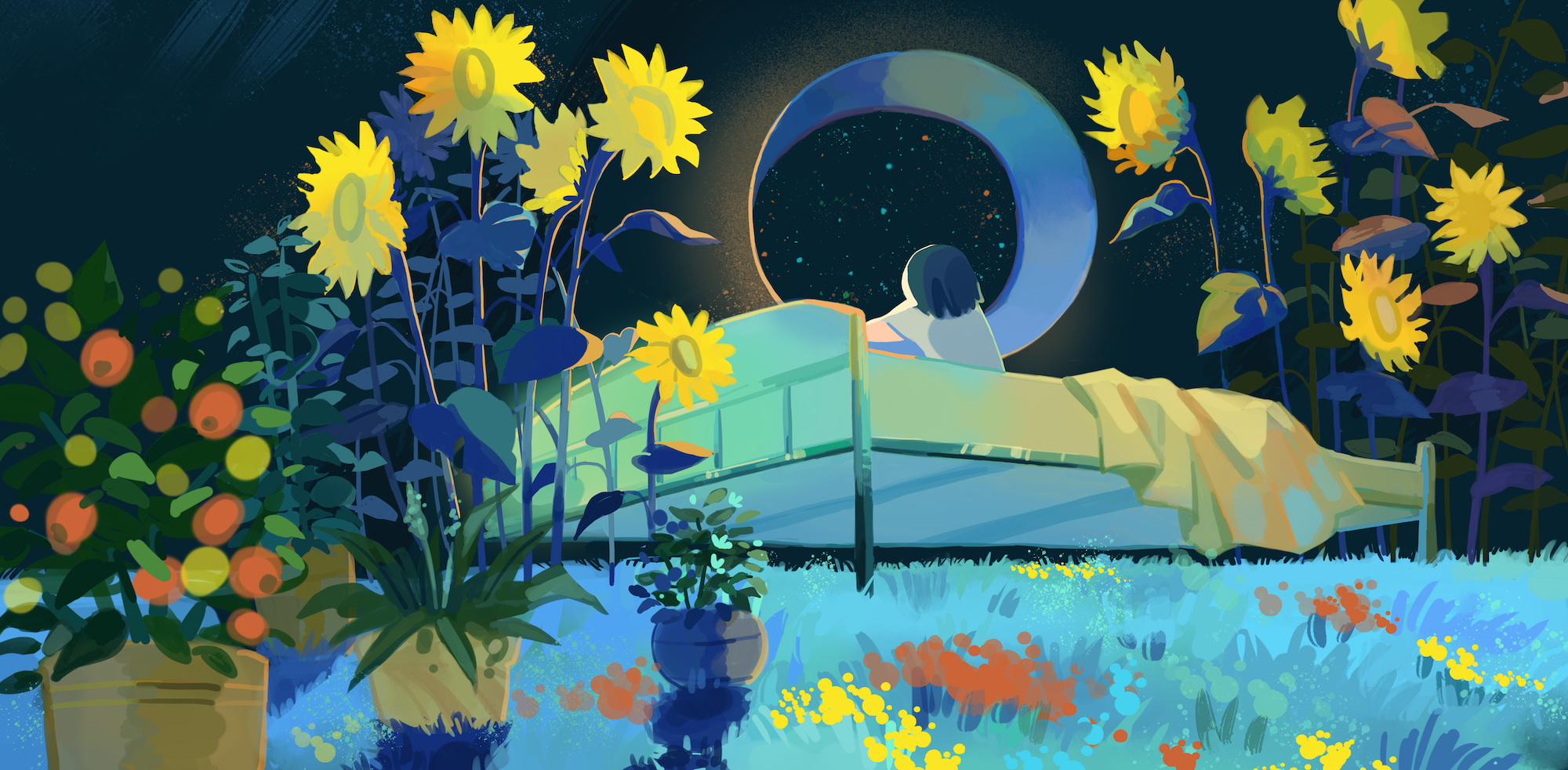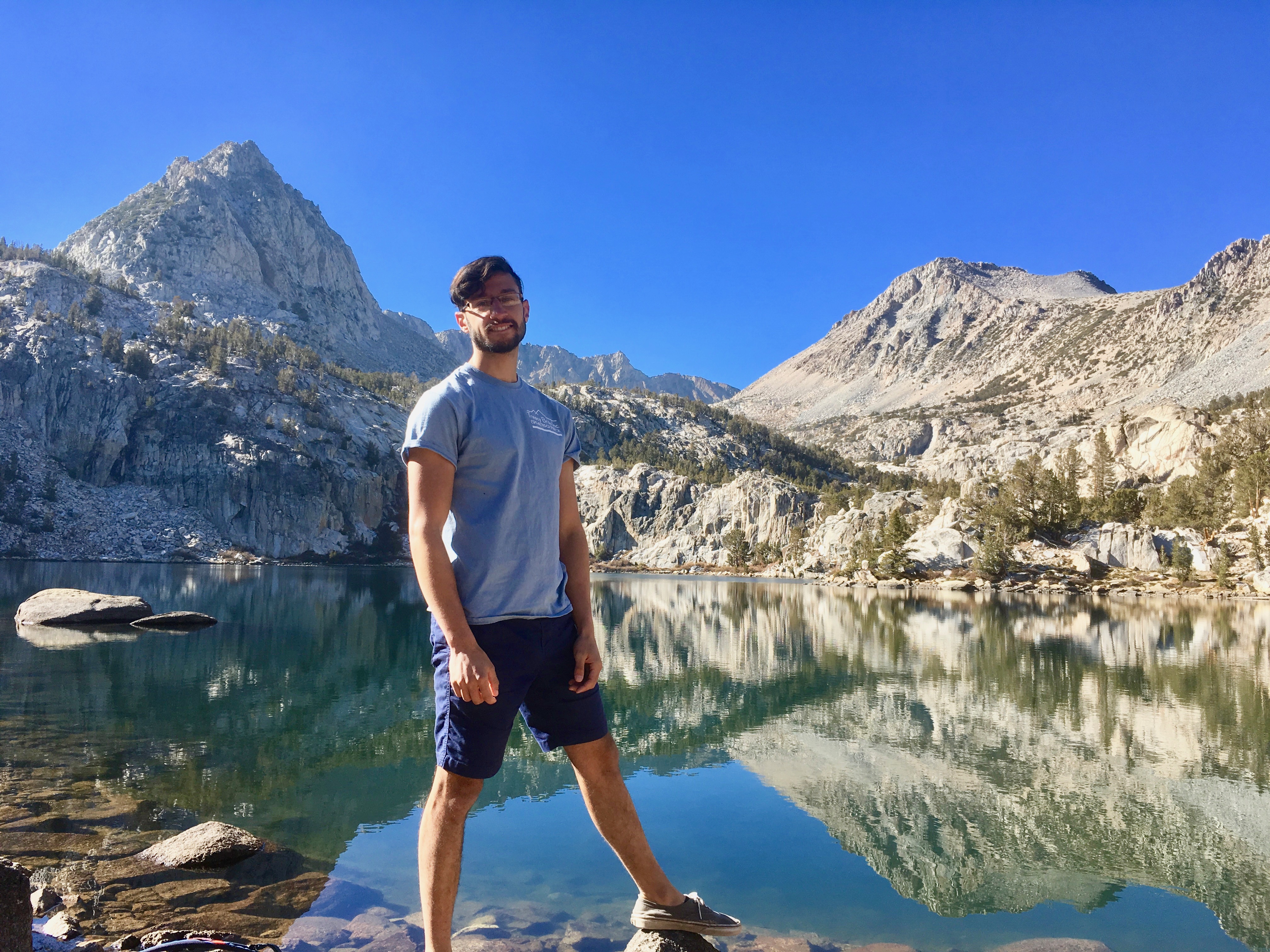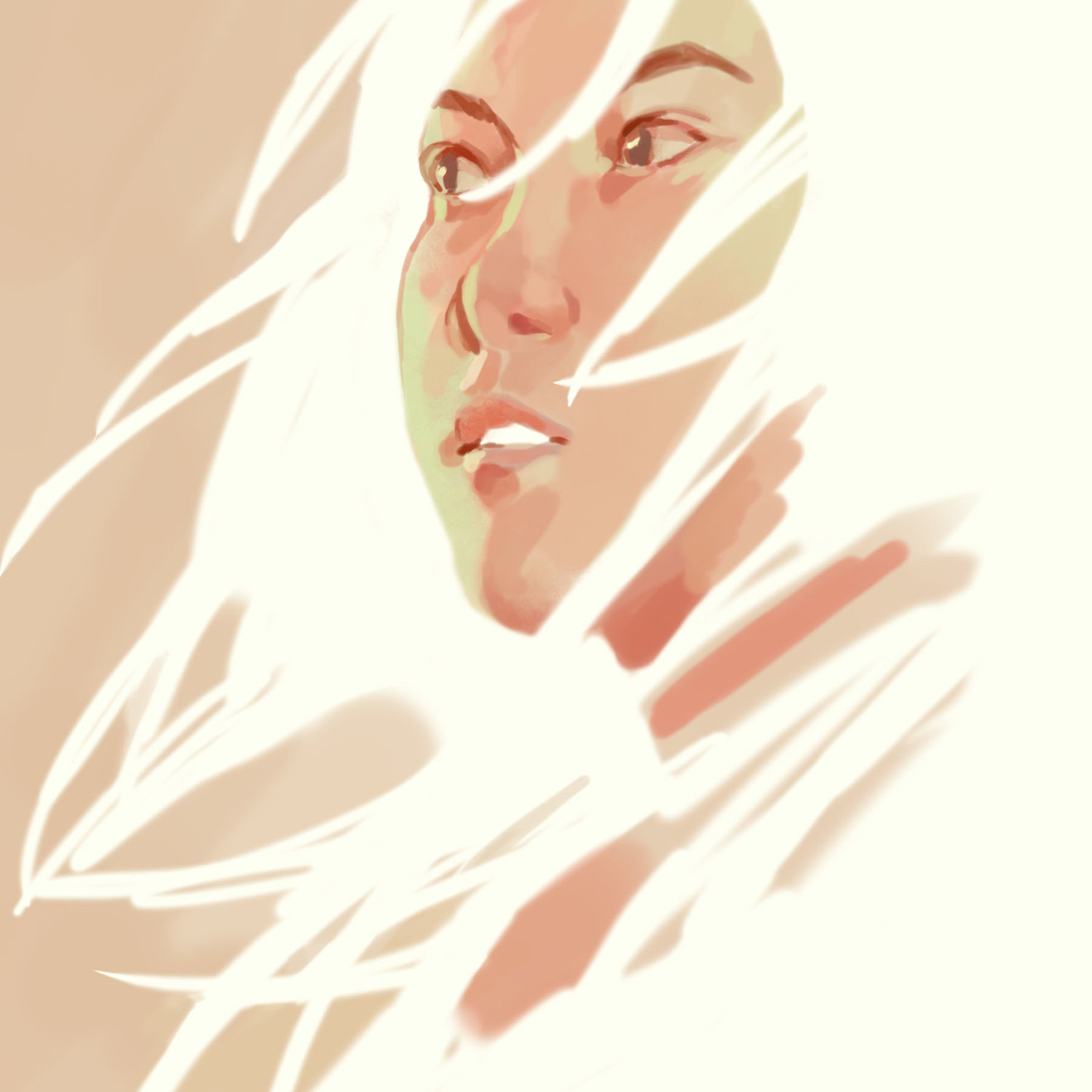Green Tunnels
by Taimur Ahmad
Illustrated by Kieu Vo | Edited by Dominik Parisien
Copyedited by Chelle Parker | Selected by Julia Rios
January 2020
Alice has forgotten most of the feelings of home. She can’t remember the heat of the sun on her skin, or the sound of cicadas, or the taste of water that hasn’t been endlessly recycled. Sometimes her father tells stories, trying to help her recreate the sensations that she has lost.
“Back home, in summer, all the trees would put out their leaves. Everything would get so lush, it was like walking through green tunnels.”
Dad reaches into his pocket and pulls out a slightly battered picture. He holds it gently, like it is a flower that might bruise if touched too carelessly. He stares at the image for a long moment. His shoulders ease downwards, the subtle tightness in his body unwinding just a bit.
“I found it by accident, in one of mom’s files. Buried under one of her papers from years back. Thought I’d lost it.” Dad hands the picture to Alice. “Look at you,” he murmurs.
Alice takes the picture and examines it. A young girl looks thoughtfully at a sunflower twice as tall as she is. Midsummer woodland stretches out into an infinite verdant haze in the background.
“It’s so hard to grow flowers like that here,” Dad says. “They need so much water, and space…”
They consider the picture in silence for a moment.
“I miss them. The flowers and green tunnels. The colors. The smells.” Dad pauses, glancing from the picture to his daughter.
“I wish we hadn’t had to move,” Alice says.
For a moment, Dad looks pained. The lines in his face deepen and crease but, before Alice can notice, he exhales out his impatience and fatigue, returning himself to a fragile calm. “I know, sweetheart. But we’re lucky that mom has the job she does.”
“Do you think we’ll ever be able to go back?”
Dad gives Alice a small, tired smile. “If your mother’s work goes well, I think so. I’d like to go back too. I really would. And I know that mom is doing everything she can to figure out how.”
Alice goes to hand the picture back to Dad, but he shakes his head.
“Keep it,” he says, before walking out.
Alice’s favorite grown-up is Dr. Pauda, who works with her mother. Dr. Pauda has a funny accent, can pull a coin out of Alice’s ear, and most importantly lets Alice help out in the lab when she gets bored.
Alice’s mother works with air — how to make it cleaner, pull out all the toxins and pollutants people had pumped into it, and make it into something a human could breathe safely again. Dr. Pauda’s job is similar, but with soil and plants.
Dr. Pauda walks into a closet and brings out two hazmat suits. He gives the smaller one to Alice before putting on his own and picking up a box full of beakers. Each beaker has a clear liquid in it.
“Are you ready?”
Alice nods, faceless in her suit. Dr. Pauda goes over to a door. He presses a button and it opens with a hiss of escaped air. Ushering Alice inside, he turns around and closes it. After a moment of pitch black, a soft red light turns on. In the dull glow, Dr. Pauda opens a second door, again closing it behind them after they pass through.
The room is lit from above by sun-lamps, which spill rich beams onto rows and rows of white plastic boxes of dirt. Most of them are fallow, but some have tiny green seedlings doggedly pushing their way towards the artificial sun.
Dr. Pauda passes Alice half the beakers. “Today, use one full beaker each per box, on rows twenty through twenty-five.”
Alice nods and sets off through the stark white light.
Later, they have hot sweet tea and cookies. (“Don’t tell your mother.”)
“Did any of them work today?”
“No, not today.”
Tucked into bed for the night, drowsy, Alice looks out the window of her room. All the views in the station are the same. They are the only views Alice knows.
She reaches out to her nightstand and picks up the photo Dad gave her. In the dim glow of her nightlight, she looks at the little girl who she can hardly remember. The sunflower is like a star burning against the backdrop of a green cosmos.
That night, Alice dreams of green tunnels. She is walking barefoot through the forests she cannot remember, breathing the clean air her mother strives for, dirtying her feet in the soil Dr. Pauda cannot create. The trees lean over each other, bows arching across the sky, making a royal hall for Alice to proceed down. By the roots of the trees are sunflowers, their heads heavy as they bow before Alice, turning as she passes by.
The next day, Alice goes back to Dr. Pauda. “Can I have a plant?”
Dr. Pauda looks up from his work. “Any plant?”
Alice nods.
Dr. Pauda shrugs. “I suppose I can spare some of the ones we’ve finished with. Would you like a ficus or a wisteria?”
Alice takes the ficus back to her room. Her shutters are open and outside is a thick black night, punctuated here and there by pinpricks of stars. She places the ficus on her windowsill and gives it water until liquid starts pooling on top of the soil.
In the morning, it is already dead.
“You gave it too much water,” Dr. Pauda tells her. “We bred these to be really dry-growing. They hardly need more than a cup every few days.”
Alice fixes her eyes on the ground.
“What’s wrong, Alice?”
“I killed it.”
Dr. Pauda kneels in front of her. “We’ve all done it.”
That night Alice dreams again. Confused dreams, of forests razed and sunflowers withering in the heat, of smoke staining the sky black and of people stoking the fires anyway, letting them burn and burn and burn until everyone chokes on the fumes. She wakes up thinking of green tunnels.
Over the next few months, Alice tries to build a tunnel of her own. She refuses to let her parents into her room, only telling them to please wait. First she plants a window box of wisteria, then a second ficus. Dr. Pauda gradually lets Alice take morning glories, white asters, clovers, and tomatoes that she can hang from her ceiling. For her birthday, he surprises her with a sunflower, which gets its own pot and a special place near the head of her bed.
“I thought these were too hard to grow here…” Alice says.
Dr. Pauda just smiles at her. “Enjoy it.”
“You can open your eyes now.”
Dad doesn’t say anything at first. The room has become a jungle. The walls have vanished in a covering of bluegrass and, when dad stands up, his head bumps into tomatoes, gets tangled in wisteria hung with purple-white blooms. The floor is carpeted in rich neon moss, with only a narrow winding path of slate grey lichen leading to Alice’s bed. Underneath the bed, mushrooms squat in the dark. The air is damp with moisture and heady with the lives of growing things. The sunflower towers, but never stops nodding demurely to its caretaker.
“Is it like home was?” Alice asks anxiously.
Dad can only stare. “It’s beautiful, honey.”
Outside, it is dark. When Dad leaves and turns off the light, the mushrooms beneath the bed begin to glow.
Alice has never heard her father cry before. Curled up under the covers of her bed, she hears it through the crack under the door. The sound works its way into her gut and makes her uneasy. Getting out of bed, she lays down on the floor and peeks through the crack. Dad is sitting limply in a chair, hands over his eyes. Alice’s mother kneels next to him, one hand on his back, the other on his thigh.
“Have you given up yet?” Dad asks.
Mom’s face is pinched, and pale, but she keeps her eyes firmly on Dad’s. She speaks quietly. “No, Jon. I’m just tired. I’ve tried everything I’ve been able to think of. But I haven’t given up yet.”
“But, you’ll find a way? One day?”
“None of us who chose to come here were ever sure, we only hoped. I really thought I might…” She falls silent for a moment. “We still hope.”
“Sometimes I wish I’d stayed at home, even if it meant suffocating with everyone else.”
Mom reaches up and moves Dad’s hands from his eyes. He looks at her. When Mom speaks, there is a serious note mixed in with the sympathy in her voice. “We both know you don’t mean that. Look at everything you have up here. Everything we have. Our daughter…”
Dad glances back towards Alice’s room. Alice holds her breath, even though she knows Dad can’t possibly see her through the crack under the door.
“I’m not giving up,” Mom finally says. “There just might not be a solution in our lifetime.”
Dad looks back at her. “And Alice’s?”
Silence.
Alice hears Dad start to cry again, and that scares her more than anything. “I told Alice we might go home…”
“It stopped being home a long time ago.”
Alone in her room, Alice snuggles back into the covers. She wishes she could remember the green tunnels, even if thinking about them makes Dad cry. The bed is backlit by the phosphorescent mushrooms, and in their light Alice looks out at the ever-present darkness.
It is gorgeous. Stars wheeling across the sky, planets strung out in dizzying orbits, galaxies scattered like dust in a breeze… and, gently rotating on its axis, a solitary blue planet. Alice looks at her sunflower. It bends down low over her, as if it is about to whisper something in her ear. Some sunflower secret, a recipe for good clean air her mother doesn’t know…
“But you can’t talk,” Alice says quietly.
The sunflower bows its head.


